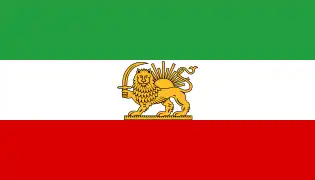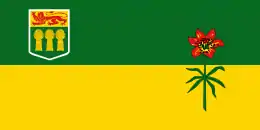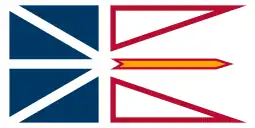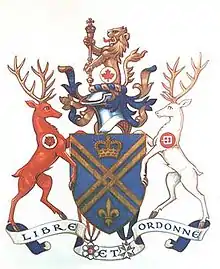Roland Michener | |
|---|---|
.jpg.webp) Michener in 1972 | |
| 20th Governor General of Canada | |
| In office April 17, 1967 – January 14, 1974 | |
| Monarch | Elizabeth II |
| Prime Minister | Lester B. Pearson Pierre Trudeau |
| Preceded by | Georges Vanier |
| Succeeded by | Jules Léger |
| 24th Speaker of the House of Commons of Canada | |
| In office October 14, 1957 – September 26, 1962 | |
| Monarch | Elizabeth II |
| Governors General | Vincent Massey Georges Vanier |
| Prime Minister | John Diefenbaker |
| Preceded by | Louis-René Beaudoin |
| Succeeded by | Marcel Lambert |
| More... | |
| Personal details | |
| Born | Daniel Roland Michener April 19, 1900 Lacombe, Northwest Territories, Canada (now Lacombe, Alberta) |
| Died | August 6, 1991 (aged 91) Toronto, Ontario, Canada |
| Spouse | Norah Michener |
| Alma mater | University of Alberta (BA) Hertford College, Oxford (MA, BCL) |
| Profession | Lawyer, Politician, Diplomat |
| Signature | |
Daniel Roland Michener PC CC CMM OOnt CD QC FRHSC(hon) (April 19, 1900 – August 6, 1991) was a Canadian lawyer, politician, and diplomat who served as Governor General of Canada, the 20th since Canadian Confederation.
Michener was born and educated in Alberta. In 1917 he served briefly in the Royal Air Force.[1] He acquired a university degree, then attended the University of Oxford as a Rhodes Scholar. Michener then returned to Canada and practised law before entering politics. He was elected to the House of Commons in 1957, where he served as speaker until 1962, and then served in diplomatic postings between 1964 and 1967. After that he was appointed Governor General by Queen Elizabeth II on the recommendation of Prime Minister of Canada Lester B. Pearson, to replace Georges Vanier, and he occupied the post until succeeded by Jules Léger in 1974. Michener proved to be a populist governor general whose tenure is considered to be a key turning point in the history of his office.
On October 15, 1962, Michener was sworn into the Queen's Privy Council for Canada.[2] He then served on the boards of various corporations and charities and sat as Chancellor of Queen's University.
Youth and education
Michener was born in Lacombe, Alberta (then part of the Northwest Territories), to Senator Edward Michener and Mary E. Roland.[3][4] He attended the University of Alberta, where he earned a Bachelor of Arts degree and a Rhodes Scholarship that took him to Hertford College at the University of Oxford. There, he played for the Oxford University Ice Hockey Club and met Lester B. Pearson, who was his lifelong friend. After completing his Master of Arts and Bachelor of Civil Law degrees,[1] Michener returned to Canada, settled in Toronto and practised law. At the same time, he acted as the general secretary for the Rhodes Foundation in Canada between 1936 and 1964 and sat as chairman of the Manitoba Royal Commission on Local Government.[1]
On February 26, 1927, in St. Mary Magdalene Anglican Church, Michener married Norah Willis; the couple had three daughters.[3]
Political career
Michener first ran for political office in Ontario's 1943 election as the Progressive Conservative candidate in the riding of St. David, but was defeated by William Dennison of the Co-operative Commonwealth Federation (CCF).[5] Michener ran in St. David again in the 1945 election and defeated Dennison this time[6] Michener was then appointed to Premier George Drew's cabinet as provincial secretary and registrar of Ontario, being responsible for formalizing cabinet procedures, including agenda and minutes. In the 1948 provincial election, Dennison took St. David back from Michener.
Michener then tried to enter federal politics in the 1949 election but was unsuccessful. He tried again in the election of 1953 and was elected in the riding of St. Paul's. In 1956, the Progressive Conservative party chose John Diefenbaker as its leader at its leadership convention, and in the election the following year the Tories attained a minority government. Michener was appointed speaker of the House of Commons, after the post was turned down by Stanley Knowles.
As Speaker, Michener angered Diefenbaker by allowing the opposition a great degree of latitude during Question Period; at one point, on May 25, 1959, Diefenbaker was so flustered that he refused to sit down when called to order by Michener. Actions like these, among others, impressed parliamentary observers and a group of university professors initiated a campaign to make Michener's position as speaker permanent; they proposed that, as is the tradition with the Speaker of the House of Commons of the United Kingdom, Michener run as an independent in general elections and that the political parties agree not to run candidates against him. No such agreement, however came to pass, and when Michener ran for re-election in 1962 he was defeated. This was the first time since 1867 that a speaker had lost his riding in an election in which his party formed the government. Michener returned to Toronto and dedicated his time to his law practice, Lang Michener LLP.
In the 1963 federal election the Liberal Party under Michener's old friend, Lester Pearson, won a minority in the House. A year later, Pearson advised Governor General Georges Vanier to appoint Michener to the diplomatic post of high commissioner to India,[7] which Michener took up on July 9, 1964. Six months later Michener became Canada's first ambassador to Nepal.[8] While stationed on those foreign duties, Michener was told by the Prime Minister that he would be considered among the leading candidates for the post of Governor General when he returned to Canada. But Vanier was in poor health and, though he offered to stay on as viceroy through to the end of the Canadian Centennial celebrations, Pearson did not wish to advise Queen Elizabeth II to allow it. The night after he conferred with the prime minister about that matter, Vanier died on March 5 at Rideau Hall, leaving Chief Justice Robert Taschereau as Administrator of the Government in the absence of a viceroy.
Governor General of Canada
Michener was immediately recalled from India and, on March 29, 1967, Queen Elizabeth II appointed Michener as the Governor General on Pearson's advice.[9][10] Although he was a Conservative, Liberal members of parliament and cabinet ministers welcomed the selection of Michener; Paul Martin Sr. said, "I don’t think there was anybody inside or outside the public service who could qualify better than Michener... People just felt that this was a good appointment."[11] Michener was sworn in during a ceremony in the Senate chamber on April 17, after one of the shortest periods served by a Governor General-designate.
Only ten days after Michener was made viceroy, he opened Expo 67 in Montreal. The exposition, held on the 100th anniversary of Confederation, attracted fifty-three heads of state and numerous other dignitaries; as the representative of Canada's head of state, Michener greeted and held audience with each of them. Among the guests were United States President Lyndon B. Johnson; Princess Grace of Monaco; former US First Lady Jacqueline Kennedy; Emperor Haile Selassie of Ethiopia; and French president Charles de Gaulle. Michener welcomed de Gaulle when he landed at his first stop in Canada, Quebec City,[12] and was present when the French president declared "Vive le Québec libre" to a crowd at Montreal City Hall. The crowd cheered de Gaulle wildly, but booed and jeered Michener when the Royal Anthem, "God Save the Queen", was played at his arrival.[13]

Within less than a year of his becoming viceroy, Michener found himself faced with a constitutional crisis when Pearson's government was unexpectedly defeated on a tax bill in February 1968. Had the government been unable to pass a full budget bill, then Pearson would have been legally required to resign or ask for a new election, but the conventions relating to lesser financial bills were less clear. After taking much legal advice, Michener decreed that he would not ask for Pearson's resignation unless an explicit motion of no confidence against the government was passed. Opposition leader Robert Stanfield immediately tabled such a motion, but it ultimately failed after the other main opposition parties, the New Democratic Party and Ralliement créditiste, declined to support the motion. An election nonetheless took place in June of that year, following Pearson's retirement and replacement by Pierre Trudeau.[14]
In October 1970, members of the Front de libération du Québec (FLQ) kidnapped British trade commissioner James Cross and Quebec's minister of labour, Pierre Laporte, thus sparking the October Crisis. In 2010, in interviews with Jacques Lanctôt, Jacques Rose, and other involved in the kidnappings, done for a documentary aired on Tout le monde en parle, it was revealed that Michener had been the FLQ's intended target; it was alleged that the FLQ leaders planned to commandeer the Canadian Broadcasting Corporation's Télévision de Radio-Canada and conduct a 24-hour telethon with the Governor General bound in a chair as a prop on the stage.[15] Upon the kidnappings, Michener, as Governor-in-Council, invoked the War Measures Act, and Quebec police, with the support of the Canadian Forces, rounded up hundreds of individuals, leading to the detention of the kidnappers and their accomplices.
On July 1, 1967, the Order of Canada was created, and Michener became the order's first member, as well as the first chancellor and principal companion.[16] As such, he presided over the first investiture ceremony, at Rideau Hall, on July 9, investing 90 people into the order. On a visit to London, United Kingdom, he presented the insignia of the Sovereign of the order to Queen Elizabeth II.[17] On July 1, 1972, the Order of Military Merit was founded and Michener was appointed the first Chancellor and Commander.
.jpg.webp)
Another first was Michener's state visit in 1971 to Trinidad and Tobago; while King George VI and Queen Elizabeth II had both carried out state visits on behalf of Canada and previous governors general had made official visits abroad, no Canadian governor general had ever previously undertaken such a trip. In October of the same year, the Governor General visited Iran to attend the Iranian monarchy's 2,500th anniversary. These voyages initially caused controversy among diplomatic insiders in Ottawa, who viewed it as inappropriate for someone who was not the country's head of state to undertake a state visit. However, the successes of the trip helped end the controversy, and established a precedent thereafter followed in Canada, and adopted by other Commonwealth realms.
Legacy
Though he wore the elaborate court uniform for state occasions, Michener discontinued the practice of women curtseying before the governor general, a move that was rumoured to have been inspired by the refusal of Maryon Pearson, wife of Prime Minister Lester Pearson, to defer thus to her long-time friends.[18] He also fostered links between his position and those of the lieutenant-governors of the provinces by holding periodic meetings with them, starting in 1973. He was, however, criticized for not reacting to Pierre Trudeau's "contemptuous musings" about the Crown and the governor general.[18]
Michener created two awards to be bestowed on Canadians. Reflecting his interest in sport fishing, he formed the Michener Tuna Trophy and, in demonstration of his strong relationship with many reporters and journalists, he founded in 1970 the Michener Award for Journalism. In return, besides being bestowed with a number of honours by both the Queen-in-Council and private organizations, Michener became the second of only two Canadians, after former governor general Vincent Massey, to be presented with the Royal Victorian Chain, a personal gift of the monarch, awarded to him by Queen Elizabeth II for his service.
Retirement and death
After his term as governor general, Michener and his wife moved to Toronto. They lived at 24 Thornwood Road in the Rosedale neighbourhood. Michener remained active in business throughout the country; he sat on boards of directors and promoted Canadian charities and cultural institutions. From 1973 to 1980, he served as chancellor of Queen's University, and he promoted physical activity to school children and seniors alike. To provide an example to follow, he, at the age of 80, climbed to the peak of Alberta's Mount Michener, to participate in the ceremony marking the Alberta Crown-in-Council's naming of the mountain after him. In 1990, he also agreed to allow his name to be used by the Michener Institute.[1]
In the mid-1980s, Michener became a caretaker for his wife after she was afflicted with Alzheimer's disease. She died in Toronto on January 12, 1987,[19] and Michener followed on August 6, 1991. Their ashes repose in St. Bartholomew's Anglican Church in Ottawa, directly across Sussex Drive from Rideau Hall.
Honours and arms
Michener's personal awards and decorations include the following:
![]()
![]()
![]()
![]()
![]()
![]()
![]()
![]()
![]()
![]()
- Appointments
.svg.png.webp) June 4, 1945 – June 7, 1948: Member of Provincial Parliament (MPP)
June 4, 1945 – June 7, 1948: Member of Provincial Parliament (MPP).svg.png.webp) August 10, 1953 – June 18, 1962: Member of Parliament (MP)
August 10, 1953 – June 18, 1962: Member of Parliament (MP).svg.png.webp) October 15, 1962 – August 6, 1991: Member of the Queen's Privy Council for Canada (PC)
October 15, 1962 – August 6, 1991: Member of the Queen's Privy Council for Canada (PC).svg.png.webp) April 17, 1967 – January 14, 1974: Knight of Justice, Prior, and Chief Officer in Canada of the Most Venerable Order of the Hospital of Saint John of Jerusalem (KStJ)[20]
April 17, 1967 – January 14, 1974: Knight of Justice, Prior, and Chief Officer in Canada of the Most Venerable Order of the Hospital of Saint John of Jerusalem (KStJ)[20]
- January 14, 1974 – August 6, 1991: Knight of Justice of the Most Venerable Order of the Hospital of Saint John of Jerusalem (KStJ)
.svg.png.webp) April 17, 1967 – January 14, 1974: Chief Scout of Canada
April 17, 1967 – January 14, 1974: Chief Scout of Canada.svg.png.webp) 1967 – August 6, 1991: Honorary Member of the Royal Military College of Canada Club
1967 – August 6, 1991: Honorary Member of the Royal Military College of Canada Club.svg.png.webp) July 1, 1967 – January 14, 1974: Chancellor and Principal Companion of the Order of Canada (CC)[21]
July 1, 1967 – January 14, 1974: Chancellor and Principal Companion of the Order of Canada (CC)[21]
- January 14, 1974 – August 6, 1991: Companion of the Order of Canada
.svg.png.webp) July 1, 1972 – January 14, 1974: Chancellor and Commander of the Order of Military Merit (CMM)[22]
July 1, 1972 – January 14, 1974: Chancellor and Commander of the Order of Military Merit (CMM)[22]
- January 14, 1974 – August 6, 1991: Commander of the Order of Military Merit (CMM)
.svg.png.webp) 1975 – August 6, 1991: Honorary Fellow of the Royal Heraldry Society of Canada (FRHSC(hon))[23]
1975 – August 6, 1991: Honorary Fellow of the Royal Heraldry Society of Canada (FRHSC(hon))[23] 1990 – 1991: Member of the Order of Ontario (OOnt)
1990 – 1991: Member of the Order of Ontario (OOnt)
- Medals
.svg.png.webp) 1937: King George VI Coronation Medal
1937: King George VI Coronation Medal.svg.png.webp) 1953: Queen Elizabeth II Coronation Medal
1953: Queen Elizabeth II Coronation Medal.svg.png.webp) April 17, 1967: Canadian Forces' Decoration (CD)
April 17, 1967: Canadian Forces' Decoration (CD).svg.png.webp) 1967: Canadian Centennial Medal
1967: Canadian Centennial Medal.svg.png.webp) 1977: Queen Elizabeth II Silver Jubilee Medal
1977: Queen Elizabeth II Silver Jubilee Medal 1971: Commemorative Medal of the 2500th Anniversary of the founding of the Persian Empire.[24]
1971: Commemorative Medal of the 2500th Anniversary of the founding of the Persian Empire.[24]
- Awards
.svg.png.webp) 1973: Royal Victorian Chain
1973: Royal Victorian Chain
Honorary military appointments
 April 17, 1967 – January 14, 1974: Colonel of the Governor General's Horse Guards
April 17, 1967 – January 14, 1974: Colonel of the Governor General's Horse Guards April 17, 1967 – January 14, 1974: Colonel of the Governor General's Foot Guards
April 17, 1967 – January 14, 1974: Colonel of the Governor General's Foot Guards April 17, 1967 – January 14, 1974: Colonel of the Canadian Grenadier Guards
April 17, 1967 – January 14, 1974: Colonel of the Canadian Grenadier Guards
Honorary degrees
.svg.png.webp) 1958: Queen's University, Doctor of Laws (LLD)[25]
1958: Queen's University, Doctor of Laws (LLD)[25].svg.png.webp) 1967: University of Alberta, Doctor of Laws (LLD)[26]
1967: University of Alberta, Doctor of Laws (LLD)[26]
Honorific eponyms

- Awards
.svg.png.webp) Canada: Michener Award for Journalism
Canada: Michener Award for Journalism.svg.png.webp) Canada: Michener Fellowships (later Michener/Deacon Fellowships)
Canada: Michener Fellowships (later Michener/Deacon Fellowships) Ontario: Roland Michener Trophy
Ontario: Roland Michener Trophy
- Organisations
.svg.png.webp) Canada: Michener Awards Foundation
Canada: Michener Awards Foundation Ontario: The Michener Institute
Ontario: The Michener Institute
- Geographic locations
 Alberta: Mount Michener
Alberta: Mount Michener Saskatchewan: Michener Drive – Regina
Saskatchewan: Michener Drive – Regina Saskatchewan: Michener Crescent, Court, Place, Way – Saskatoon
Saskatchewan: Michener Crescent, Court, Place, Way – Saskatoon Newfoundland and Labrador: Michener Avenue – Mount Pearl
Newfoundland and Labrador: Michener Avenue – Mount Pearl
- Buildings
- Schools
 Alberta: Roland Michener Elementary, Calgary
Alberta: Roland Michener Elementary, Calgary Alberta: Roland Michener Secondary School, Slave Lake
Alberta: Roland Michener Secondary School, Slave Lake Ontario: Roland Michener Public School, Ajax
Ontario: Roland Michener Public School, Ajax Ontario: Roland Michener Public School, Kanata
Ontario: Roland Michener Public School, Kanata Ontario: Roland Michener Secondary School, Timmins
Ontario: Roland Michener Secondary School, Timmins Saskatchewan: Roland Michener School, Saskatoon
Saskatchewan: Roland Michener School, Saskatoon
Arms
 |
|
Archives
There is a Roland Michener fonds at Library and Archives Canada.[27]
See also
References
- 1 2 3 4 "The Michener Institute > About Michener > Biography of D. Roland Michener". The Michener Institute. 2007. Archived from the original on September 27, 2007. Retrieved March 11, 2009.
- ↑ Privy Council Office (October 30, 2008). "Information Resources > Historical Alphabetical List since 1867 of Members of the Queen's Privy Council for Canada > M". Queen's Printer for Canada. Retrieved March 11, 2009.
- 1 2 "A History of the Campus and Its People > People in Queen's History > Chancellors since 1877 > The Rt Hon Daniel Roland Michener (1900–1991)". Queen's University. Archived from the original on March 27, 2009. Retrieved March 12, 2009.
- ↑ Parker, C.W. (1914). Who's who in Canada: an illustrated biographical record of men and women of the time. Vol. 6–7. Toronto: International Press Limited. p. 960.
- ↑ Canadian Press (1943-08-05). "Ontario Election Results". The Gazette. Montreal. p. 12.
- ↑ Canadian Press (1945-06-05). "How Ontario Electors Voted in all 90 Ridings". The Toronto Daily Star. Toronto. p. 5. Retrieved 2012-03-03.
- ↑ Department of Foreign Affairs and International Trade. "About the Department > Canadian Heads of Posts Abroad from 1880 > India". Queen's Printer for Canada. Archived from the original on March 22, 2012. Retrieved March 11, 2009.
- ↑ Department of Foreign Affairs and International Trade. "About the Department > Canadian Heads of Posts Abroad from 1880 > Nepal". Queen's Printer for Canada. Archived from the original on March 22, 2012. Retrieved March 11, 2009.
- ↑ Office of the Governor General of Canada. "Governor General > Former Governors General > The Right Honourable Daniel Roland Michener". Queen's Printer for Canada. Retrieved March 11, 2009.
- ↑ "Canada Gazette volume 101, number 16, 22 April 1967". Library and Archives Canada. Retrieved 1 January 2017.
- ↑ Milnes, Arthur (May 5, 2010). "Have we found our next Governor General?". Toronto Star. Retrieved May 5, 2010.
- ↑ Berton, Pierre (1997). 1967: The Last Good Year. Toronto: Doubleday Canada Limited. pp. 300–312. ISBN 0-385-25662-0.
- ↑ Quebec Bureau (July 24, 1967). "Quebec gives de Gaulle, warm reserved welcome". The Globe and Mail. Toronto. pp. 1, 10.
- ↑ Robertson, Gordon; Memoirs of a Very Civil Servant; pp299-301
- ↑ Off, Carol (September 24, 2010). "Archived copy". As it Happens. Season 42. Toronto. 35:30–44:50 minutes in. Canadian Broadcasting Corporation. Archived from the original on September 30, 2010. Retrieved September 28, 2010.
- ↑ Order of Canada citation
- ↑ "Mailbox". Royal Insight Magazine. London: Queen's Printer (April 2006): 3. Retrieved March 14, 2008.
- 1 2 Pepall, John (1 March 1990). "Who is the Governor General?". The Idler. Toronto. Archived from the original on 6 July 2011. Retrieved 13 November 2010.
- ↑ Delacourt, Susan (January 14, 1987), "Norah Michener: Philosopher enhanced Rideau Hall", The Globe and Mail, p. A17
- ↑ Office of the Governor General of Canada. "Honours > Insignia Worn by the Governor General". Queen's Printer for Canada. Retrieved February 27, 2009.
- ↑ Office of the Governor General of Canada. "Honours > Order of Canada". Queen's Printer for Canada. Retrieved February 27, 2009.
- ↑ Office of the Governor General of Canada. "Honours > Order of Military Merit". Queen's Printer for Canada. Retrieved February 27, 2009.
- 1 2 3 4 "Arms of Past and Present Canadian Governors General > MICHENER, The Rt. Hon. Daniel Roland, CC, CD, FRHSC (Hon)". Royal Heraldry Society of Canada. Retrieved March 12, 2009.
- ↑ Badraie Archived 2016-03-05 at the Wayback Machine
- ↑ "HONORARY DEGREES" (PDF). Queen's University. December 15, 2008. Archived from the original (PDF) on March 4, 2009. Retrieved March 7, 2009.
- ↑ "University of Alberta Senate > Honorary Degrees > Past Honorary Degree Recipients > M". University of Alberta. Archived from the original on May 27, 2011. Retrieved April 28, 2009.
- ↑ "Finding aid to Roland Michener fonds, Library and Archives Canada" (PDF). Retrieved June 2, 2020.
External links
- Website of the Governor General of Canada entry for Roland Michener
- The Michener Awards Foundation
- The Michener Institute For Applied Health Sciences
- Order of Canada citation
- Daniel Roland Michener – Ontario Legislative Assembly parliamentary history (archive)
- Roland Michener – Parliament of Canada biography